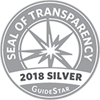September 2018
Donor Advised Fund vs Private Foundation
As giving has increased, so has the popularity of Donor-Advised Funds. A Donor-Advised Fund is a separately identified fund or account that is maintained and operated by a section 501(c) (3) organization, which is called a “sponsoring organization.” The Cadillac Area Community Foundation is a qualified sponsoring organization, and houses numerous Donor-Advised Funds.
Donors make irrevocable, endowed gifts to the sponsoring organization to establish a named fund and then recommend grants from the Fund to qualified nonprofit organizations of their choice over time. There are over 300,000 Donor-Advised Funds in the United States today–roughly three times the number of private foundations. There are many reasons they are so popular and growing; I have listed a few:
*It takes just a few minutes to create a Donor-Advised Fund, and donors can recommend grants from their Fund at any time. Like private foundations, the original donor may assign successive advisors so that others may carry on their legacy of giving when they are gone.
*Donors may give a wide variety of assets, including cash, appreciated stock, life insurance policies, and real estate. Donor-Advised Funds provide donors with significant tax advantages. Contributions are deductible, and gifts of appreciated property like public stock, closely-held stock, and real estate are deductible at full fair market value. This is a significant advantage over giving closely-held stock or real estate to a private foundation, where the deduction is limited to the cost basis of the asset.
*There are no costs to establish a Donor-Advised Fund and no separate tax filings. Administrative fees are minimal, and the sponsoring organization takes care of all filings.
*Donor-Advised Funds allow donors to recommend grants over their own timelines. The donor has flexibility when unique tax events arise. For example, an individual who sells a company can easily establish a Donor-Advised Fund to help maximize immediate tax benefits and then recommend grants in the years ahead.
*Donors who choose to give through their Donor-Advised Fund may remain anonymous if they wish. This is difficult to achieve with private foundations due to the public nature of their tax filings.
If taking charge of your personal philanthropy, and supporting the organizations and interests that are important to you is one of your goals, I invite you to call me to further discuss Donor-Advised Funds.
Best Regards,
Doreen


